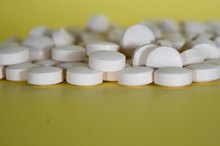What Is The Effect of Quinine Tonic Water on Arthritis?
There are many anecdotal and hearsay claims that drinking tonic water, which contains quinine, can help alleviate the symptoms of arthritis. Unfortunately, there is little, if any, scientific proof that drinking commercially available tonic water is effective. In fact, the U.S. Food and Drug Administration has limited the legal amount of quinine in tonic water to 83 parts per million. That is only 25 to 50 percent of the amount used for therapeutic purposes.
Before turning to supermarket shelves for arthritis treatments, it is important that you consult a rheumatologist or other healthcare professional with experience in treating arthritis. This is because you will want to obtain the best advice and treatment based on scientific evidence.
Quinine is still used because it is the chemical basis of hydroxychloroquine (Plaquenil), which is used for treating malaria and lupus.
Research
Michael E. Weinblatt, M.D. reviewed the history of arthritis treatments and medications in “Rheumatoid Arthritis: More Aggressive Approach Improves Outlook,” his 2004 article for the Cleveland Clinic Journal of Medicine. He noted that some remedies used in the past are now considered to have limited value or to be harmful. For example:
• Gold injections • Open air bed rest • Iodine • Arsenic • Colonic lavage • Gin or whiskey at dinner • Quinine
Most of these treatments are no longer in use. However, quinine is still used because it is the chemical basis of hydroxychloroquine (Plaquenil), which is used for treating malaria and lupus.
- Michael E. Weinblatt, M.D.
- reviewed the history of arthritis treatments and medications in “Rheumatoid Arthritis: More Aggressive Approach Improves Outlook,” his 2004 article for the Cleveland Clinic Journal of Medicine.
Hydroxychloroquine
Calories in Bacardi and Diet Coke
Learn More
Hydroxychloroquine is also a disease-modifying antirheumatic drug (DMARD). According to the Mayo Clinic, DMARDs can keep rheumatoid arthritis from getting worse by preventing permanent tissue damage around joints. Side effects of DMARDs might include lung infections, liver damage, and suppression of bone marrow.
Hydroxychloroquine may improve symptoms of rheumatoid arthritis symptoms in roughly half a year. If you use this medication and your symptoms don’t improve in that time window, or if they get worse, experts at the National Institutes of Health recommend that you discontinue the medication and call your physician. They add that if the drug does improve your condition, your symptoms will return if you stop taking it. Therefore, you should talk to you doctor before you stop using it.
Remember, though, that tonic water is not a substitute or alternative to hydroxychloroquine. Tonic water only has a fraction of the quinine used for therapeutic purposes.
- Hydroxychloroquine is also a disease-modifying antirheumatic drug (DMARD).
- If you use this medication and your symptoms don’t improve in that time window, or if they get worse, experts at the National Institutes of Health recommend that you discontinue the medication and call your physician.
About the Author
Dean Haycock holds a Ph.D. in Biology from Brown University and received a fellowship from the National Institute of Mental Health to study at The Rockefeller University.
His neuropharmacology research has been published in the Journals of Neurochemistry, Biological Chemistry, Medicinal Chemistry, Pharmacology and Experimental Therapeutics and in Brain Research.
Haycock is the author of The Everything Health Guide to Schizophrenia, The Everything Health Guide to Adult Bipolar Disorder, 2nd edition, and co-author of Overcoming Complications of LASIK and Other Eye Surgeries.
Related Articles
References
- Achan J, Talisuna AO, Erhart A, et al. Quinine, an old anti-malarial drug in a modern world: role in the treatment of malaria. Malar J. 2011;10:144. doi:10.1186/1475-2875-10-144
- U.S. Food and Drug Administration. FDA drug safety communication: New risk management plan and patient medication guide for Qualaquin (quinine sulfate). Updated August 3, 2017.
- Howard MA, Hibbard AB, Terrell DR, Medina PJ, Vesely SK, George JN. Quinine allergy causing acute severe systemic illness: report of 4 patients manifesting multiple hematologic, renal, and hepatic abnormalities. Proc (Bayl Univ Med Cent). 2003;16(1):21-6. doi:10.1080/08998280.2003.11927884
- Winter FD. Immune thrombocytopenia associated with consumption of tonic water. Proc (Bayl Univ Med Cent). 2015;28(2):213-6. doi:10.1080/08998280.2015.11929233
- Winter FD. Immune thrombocytopenia associated with consumption of tonic water. Proc (Bayl Univ Med Cent). 2015;28(2):213-6. doi:10.1080/08998280.2015.11929233
Resources








